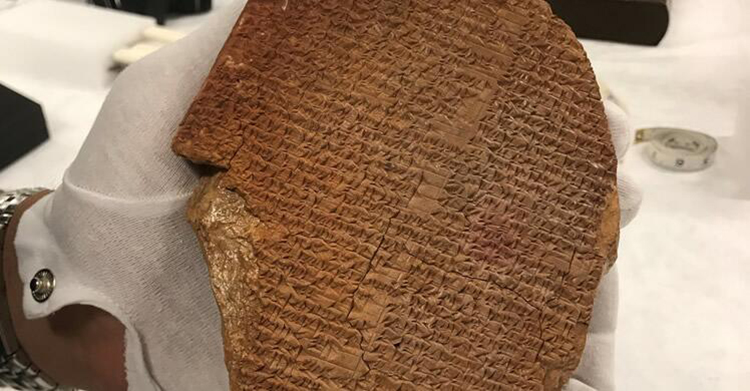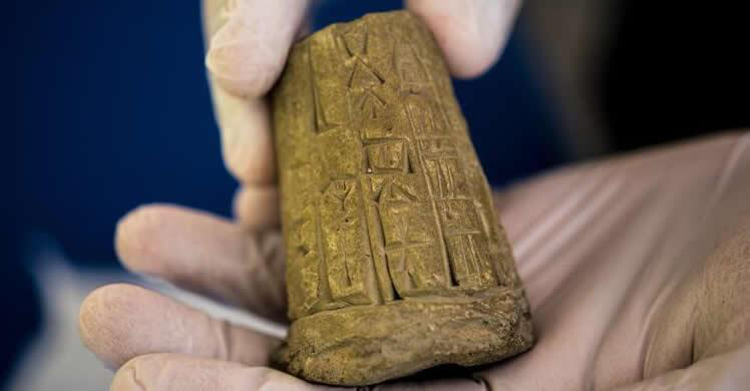
The cuneiform tablet bearing a portion of the epic of Gilgamesh, known as the Gilgamesh Dream Tablet. (Photo: U.S. Immigration and Customs Enforcement)
Ancient Mesopotamia is often called a “cradle of civilization.” The ancient kingdoms which once lay alongside the Euphrates and Tigris rivers occupied a fertile crescent of land from which they built magnificent palaces, advanced bureaucracies, mathematical knowledge, and law codes. Unfortunately, colonialism and modern wars have allowed for extensive looting across the region. In a large step for the repatriation of historic objects, 17,000 ancient objects have been returned to Iraq. This will soon include a rare tablet containing part of the Epic of Gilgamesh.
The 17,000 objects include clay tablets and cylinders from the civilizations of ancient Mesopotamia—which now is contained within Iraq, Iran, Turkey, Syria, and Kuwait. Of the objects recently repatriated, 12,000 came from the Museum of the Bible in Washington, D.C. The museum was founded by the president of craft company Hobby Lobby, Steve Green. Hobby Lobby’s acquisition of ancient artifacts from the Near East has been under scrutiny for several years. The company received and purchased looted objects, some of which had already been returned in 2018. Another 5,000 objects of the recent repatriation were previously at Cornell University. Donated in 2000, the objects are from the Sumerian city of Garsana and are thought to have been looted.
Looted objects are becoming the center of legal and ethical debates for museums and national governments. Some pieces were acquired through warfare or colonization, often before laws were established to prevent the exporting or importing of artifacts. Other instances of looting are much more contemporary and clearly in violation of existing law. In 2011, the U.S. Government seized shipments of artifacts sent to Hobby Lobby which were mislabeled; the company forfeited the items and $3 million in a civil complaint.
The artifacts of Mesopotamia have been in particular danger from looters and unscrupulous dealers since the 1990s. The Gulf Wars and other conflicts in the region prevented the protection of historic sites, many of which remain unexcavated. As a result, looted items poured into illicit international markets. Some looted items are purchased by private individuals, and others by institutions such as museums which have a responsibility of due diligence in investigating the origin of their purchases.
To this day, many artifacts remain missing. For this reason, provenance (the documented history of the artifact itself) is very important. By verifying provenance, a museum or collector can insure their artifact was not looted or forged. The Museum of the Bible could not verify the legal provenance of the thousands of returned artifacts; in their investigations, they also discovered many items to be forgeries.
One object in particular stands out from the Hobby Lobby acquisitions. A small clay tablet known as the Gilgamesh Dream Tablet bears writing in cuneiform script in the Akkadian language. From ancient Sumer, the tablet is part of the poetic Epic of Gilgamesh—one of the most ancient works of literature. The tablet’s provenance is a perfect example of how unscrupulous the antiquities market can be even when it appears legitimate. The tablet was purchased by an American dealer in 2003 from a London owner. The dealer then created a false provenance letter telling a different story, according to the U.S Immigration and Customs Authority (ICE).
This false provenance stayed with the tablet until it made its way to the famous auction house Christie’s in London. As reported by The New York Times and the U.S. Department of Justice, the auction house brokered a private sale of the tablet in 2014 to Hobby Lobby despite doubts about the item’s true provenance. As of July 2021, the tablet has been forfeited to the U.S. Government, citing its illegal importation into the country in 2003 and 2014. The Museum of the Bible—which held the tablet—is reportedly cooperating with the forfeiture. The tablet is not part of the 17,000 objects recently returned, but will soon also make its journey to its nation of origin.
The repatriation of these historical artifacts is important, no matter how famous or obscure the item. Hassan Nadhem, the Iraqi minister of culture, tourism and antiquities, told The New York Times, “This is not just about thousands of tablets coming back to Iraq again—it is about the Iraqi people…It restores not just the tablets, but the confidence of the Iraqi people by enhancing and supporting the Iraqi identity in these difficult times.” Returning artifacts to their places of origin also allows local scholars to finally have access to these important parts of their own history.
17,000 looted ancient Mesopotamian artifacts are returned to Iraq from the U.S., in particular from the purchases of Hobby Lobby and the collection of Cornell University.

A clay cylinder seized in 2018 from Hobby Lobby and returned to Iraq by US ICE. (Photo: U.S. Immigration and Customs Enforcement)
h/t: [IFL Science, The New York Times]
Related Articles:
What Is the Rosetta Stone? Learn the History Behind This Legendary Ancient Artifact
The Brooklyn Museum Returns 1,300+ Ancient Artifacts to Costa Rica
German Museum Repatriates Lakota Chief’s Embroidered Leather Shirt to His Descendants
What Is Ancient Assyrian Art? Discover the Visual Culture of This Powerful Empire
